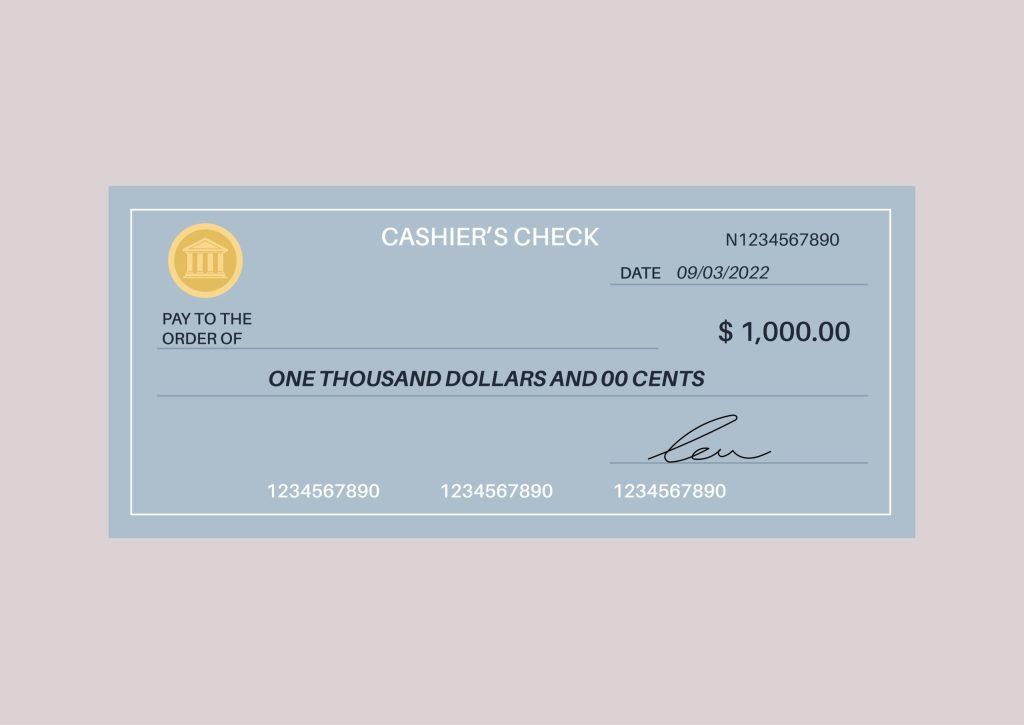Do you ever need to make a purchase, but debit cards, personal checks or cash is not an option? That’s where Cashier’s Checks and Money Orders come into play. Both options are convenient and secure payment methods, but we’ll discuss some of the major differences between them in this article. There are times when one will be a better option than the other.
What is a Cashier’s Check?
A Cashier’s Check is a paper check issued by a bank or credit union to an account holder of their institution. For Cashier’s Checks, the funds are guaranteed by the bank or credit union and withdrawn directly from the member’s account, giving the recipient immediate access to the funds.
What is a Money Order?
A Money Order is a prepaid payment used to pay or send money to people as a potentially safer alternative to cash or personal checks. Funds are guaranteed and Money Orders can be purchased at a variety of locations. They are a perfect alternative if you don’t have access to checks or a checking account.
When to use a Cashier’s Check vs Money Order
Although they are similar payment types, there are scenarios where you’ll want to use a Cashier’s Check over a Money Order, and vice versa.
| Use a Cashier’s Check When |
Use a Money Order When |
- Payments over $1000
- You want payment secured by bank or credit union
|
- Payments under $1000
- You don’t have a bank account
|
Maximum Payment Limit
The most significant difference between Cashier’s Checks and Money Orders is the limit. Cashier’s Checks are often used for larger purchases over $1,000, such as buying a vehicle or making a deposit for a new apartment.
Money Orders should be used for smaller purchases, for example at HFS FCU, we do not issue Money Orders for amounts greater than $1000. Money Orders are not as secure of a payment method as Cashier’s Checks, which is why smaller amounts are recommended.
Cost
While both options do incur a cost, Money orders usually cost less. Depending on the amount and where it is purchased, a Money Order could cost anywhere from $1 – $5. A Cashier’s Check can only be obtained at a financial institution, and will typically cost less than $10. Depending on the institution, the fee could even be waived for Cashier’s Checks, based on the type of account you have.
Here at HFS Federal Credit Union, members can get five free Cashier’s Checks per month, which we call an Official Check, and any additional checks only cost $1 each.
Trustworthiness
When a Cashier’s Check is issued, the financial institution fills out the “pay to” field at the time they issue the check. This ensures that only the payee of the check is able to cash or deposit it.
However, a Money Order’s payee is completed by the person purchasing it. If they forget to fill it out and the Money Order is lost or stolen, anyone who finds it will be able to cash it. This is one of the reasons Money Orders are not preferred for amounts greater than $1,000.
Protection
Both Cashier’s Checks and Money Orders have the ability to place a “stop payment”. A stop payment allows you to stop a check or payment that has not yet been processed, preventing the payee from accessing the funds. If you lose your Cashier’s Check or Money Order, or if something should go wrong with the purchase you are trying to complete, contact the issuer of the Cashier’s Check or Money Order to place a stop payment and prevent the funds from being cashed or deposited.
It’s important to take this step right away if something does go wrong. Once the payment has been processed, it’ll be too late to place a stop payment. Also, keep in mind that placing a stop payment on a check or payment can incur additional costs, but costs will vary by institution.
Availability of Funds
Unlike a personal check, when you give someone a Cashier’s Check or Money Order, the funds are guaranteed immediately. With a personal check, it typically takes a few days before the recipient can access the funds because the receiving bank has to make sure funds have been collected from the sender. Personal checks also have the ability to “bounce” if the funds cannot be collected, which often results in a fee to the payee who attempted to deposit it.
A Cashier’s Check pulls funds from the sender’s account when issued, and the funds for a Money Order are presented upon purchase. This allows payee access to the funds right away without having to wait, or worry about a check bouncing.
Where to Purchase
For those who have an account, Cashier’s Checks can be purchased at their bank or credit union. Money Orders can be purchased without having an account, which is why they are sold at a variety of locations including the post office, retail stores, convenience stores, banks and credit unions, money transfer outlets, and more.
Final Thoughts
To many, Cashier’s Checks seem like the most reliable payment option because they are issued by a financial institution. However, for those who don’t have an account with a financial institution, Cashier’s Checks are not a viable option. A Money Order makes secure and guaranteed payments an option for those without a bank account or who aren’t available during normal banking hours. Either option provides a secure and guaranteed payment process when cash and personal checks are not accepted.
HFS FCU Cashier’s Checks & Money Orders
For more information on our Cashier’s Checks and Money Orders, please visit https://hfsfcu.org/checks/ or contact us at https://hfsfcu.org/contact/.

